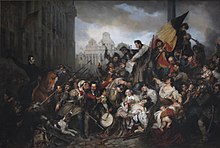Where: Britain and France
Who: Salvator Rosa, John Constable, Lord Byron, Ludwig van Beethoven, William Blake
Definition: It was a reaction away from the Enlightenment values of reason, order and intellect that was integral to its predecessor, Enlightenment, placing more emphasis on the importance of feeling and imagination.
Charles Baudelaire wrote in 1846, "Romanticism is precisely situated neither in choice of subject nor in exact truth, but in a way of feeling."
- Nature: uncontrollable power, unpredictability, and potential for cataclysmic extremes - an alternative to the ordered world of Enlightenment thought.
- Emotional and behavioral extremes
- Romanticism emphasized the individual, the subjective, the irrational, the imaginative, the personal, the spontaneous, the emotional, the visionary, and the transcendental.
- Romantic artists expanded the repertoire of subject matter, rejecting the didacticism of Neoclassical history painting in favor of imaginary and exotic subjects. Orientalism and the worlds of literature stimulated new dialogues with the past as well as the present.
- Literature offered an alternative form of escapism. The novels of Sir Walter Scott, the poetry of Lord Byron, and the drama of Shakespeare transported art to other worlds and eras.
- To William Wordsworth poetry should be "the spontaneous overflow of powerful feelings"
- importance of the individual, the unique, even the eccentric
- First gothic novel was Horace Walpole's Castle of Otranto (1765)
- Hysterical, mystical, passionate adventures of terrified heroes and heroines in the clutches of frightening, mysterious forces

Further Research:
http://www.britannica.com/EBchecked/topic/508675/Romanticism
http://public.wsu.edu/~brians/hum_303/romanticism.html
http://academic.brooklyn.cuny.edu/english/melani/cs6/rom.html

No comments:
Post a Comment